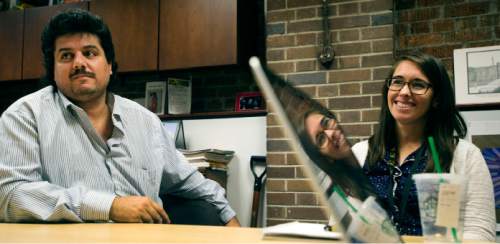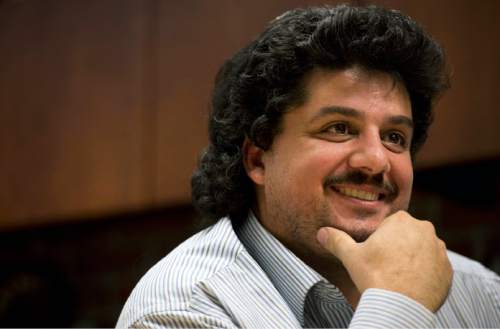This is an archived article that was published on sltrib.com in 2015, and information in the article may be outdated. It is provided only for personal research purposes and may not be reprinted.
It's not easy to run from bullets and bombs when you have two children in wheelchairs, so Nour Eddin Abdul Bari and his wife, Rzan, decided it was better to flee Syria in 2011, six months after the civil war began, rather than be sitting targets.
They are now refugees living in Midvale in a four-bedroom apartment designed for people with physical disabilities. They have endured a four-year trek that took them to Libya and Egypt, countries also struggling with political unrest, before they were granted passage to the United States.
The Salt Lake Valley wasn't exactly what they expected (they assumed there would be more skyscrapers), but it is exactly what they hoped for. It's a place where people have treated their disabled children with a kindness they haven't experienced before and a place where they believe they can flourish — as long as they put in the necessary work.
Eight months into their resettlement, Rzan takes care of their now five children. That includes their only daughter, Maram, age 4, who is their third child diagnosed with muscular dystrophy and severe developmental delay. The other two, Mohammed Ayham, 17, and Ehab, 16, are enrolled in a special-needs school.
Abdul Bari works part time in an Iraqi restaurant and plans to open his own place in the coming year, bringing Syrian shawarma to the valley. He plans to call it Nour al Sharq, meaning "the light of the East."
He feels pressure to provide and adapt. He hopes to make Utah his long-term home, believing Syria has been permanently shattered.
Utah takes in about 1,100 refugees a year, most recently from places such as Iraq, Burma and Congo. Since the Syrian civil war began, the state has resettled just 12 Syrians comprising two families.
That number should rise to a few hundred people in the next year, creating a small Syrian community in Utah and, Abdul Bari jokes, a built-in clientele for his restaurant.
—
"Fair share" • Syria's civil war, now in its fifth year, has spawned the worst refugee crisis in a generation, according to the United Nations, resulting in massive camps in Turkey and Lebanon and scores of overcrowded inflatable rafts headed for Greece, where migrants hope to start their journeys to other European countries. Germany originally expected to house 800,000 asylum seekers from the Middle East this year, with the bulk coming from Syria, though that could be a low estimate.
President Barack Obama has settled on a more modest number. He said the country would resettle 85,000 refugees (up from 70,000) in the next year and at least 10,000 will be from Syria. Since the civil war began, the United States has taken in 1,500 displaced Syrians.
The two resettlement agencies working in Utah — the International Rescue Committee and Catholic Community Services — have no Syrian families in the pipeline, though they expect that to change in the coming months. Still, they are frustrated by what they see as a tepid response to an international disaster. They are calling on Obama to accept 100,000 Syrians in the next year.
"I believe we can do our fair share here. We are looking at a crisis in Europe and the rest of the world, probably as big as any crisis we have seen in decades," said Patrick Poulin, executive director of the International Rescue Committee (IRC) in Salt Lake City. "We are ready to receive them now."
Top leaders of The Church of Jesus Christ of Latter-day Saints recently called on Mormons in Utah and around the globe to help ease the suffering and "participate in local refugee projects, where practical."
—
Screening concerns • Some lawmakers, including Rep. Jason Chaffetz, R-Utah, say Obama's refugee increase is an error that may be exploited by extremists.
"Make no mistake, nefarious actors will take advantage of our generosity and abuse our broken immigration system," he said. "I don't trust this administration's ability to vet new arrivals."
In 2011, two Iraqi refugees living in Kentucky were arrested on terrorism charges for allegedly planning to send weapons to anti-American insurgents in their home country. The FBI caught them in a sting. Since then, the State Department has increased security protocols.
Aden Batar, the refugee-resettlement director for the Utah chapter of Catholic Community Services, has heard the concern of politicians such as Chaffetz but says the nation now has a "rigorous process" to screen potential refugees that begins with fingerprints, international security checks and a battery of interviews. Bad guys, he said, are not slipping through.
"That threat doesn't exist. We haven't seen it," he said. "We are talking about women, children, people who have been victimized by ISIS."
That's the same screening process Moawiyah Bilal, his wife, Kholoud Abou Arida, and their three children went through before they were able to fly to Utah shortly before Thanksgiving last year, making them the first Syrian refugees to arrive in Utah.
They live in a modest Salt Lake City apartment. Bilal works in a hotel laundry room and Abou Arida is employed by LDS Humanitarian Services. They have had difficulty adjusting to Utah's winters and the food, and Bilal has struggled with the language. Still, they are grateful for their new lives after spending two years in a refugee camp in Lebanon, where they say they were not treated well.
"When the U.N. told us we were going to Utah, we didn't know where that was," Abou Arida told Business Insider earlier this month. "We asked friends and no one else knew either, but when we got here, we liked it very much."
She hopes her other family members will be able to join them, though she notes how hard and expensive the refugee system is to navigate. Refugees are required to repay the federal government for their transportation costs.
For the Abdul Bari family, that bill is $8,000, which they will begin repaying in small chunks.
—
A secure country • Nour Eddin Abdul Bari worked as a chef outside of Damascus. When he left, he relied on his modest savings and the help of relatives to get his family members into a residential area outside of Cairo.
A year after they fled, he heard that bombs destroyed the house he left behind. Since then, his large family has scattered throughout the world. Some are in refugee camps holding more than 2 million people in Turkey. A brother survived a precarious trip on a crowded raft and made it into Germany.
"They are endangering their lives to avoid death," Abdul Bari said, "only to live like a human being."
Asked where he hoped he would end up, he responded: "Any secure country."
He arrived in Utah in March, noting that the first two months were the toughest, having to go through a battery of medical exams for his children and trying to figure out a new place and a new language. His wife, Rzan, still struggles, as raising the family rests primarily on her shoulders. She feels cut off from the wider society and worries about her relatives still stuck in Egypt.
Their able-bodied children seem to be transitioning well.
As for Abdul Bari, he is an upbeat and confident man. He has bought a used car and says driving here is easier than in Damascus, because American drivers follow traffic laws. He's picking up English relatively quickly.
The people he has met, including his caseworkers at the IRC, have been supportive.
Outside of the Bilal family, the only Syrian Abdul Bari has met in Utah is Ghiwa, who acted as his translator during an interview with The Salt Lake Tribune.
She works at the IRC, having immigrated to Utah early this year. She has asked that her full name not be used to protect her family back in Syria. She previously worked for the U.S. Embassy in Damascus and stayed through much of the fighting.
"It was very frightful," she said, recalling the constant shelling. After she arrived in Utah, she said: "It took me four months to be able to sleep well."
She picked Utah because her brother is a physician here who immigrated two decades prior. Ghiwa was hoping she would be able to petition the United States to accept some of her relatives, but immigration rules require her to wait at least 10 years.
"I'm happy that I made it," she said, "but in many ways I'm deeply not that happy. I'm missing them."
She appreciates the opportunity to help others, such as Abdul Bari, engage with society.
And Abdul Bari wants to do the same thing. He's sponsoring a friend who is trying to make his way through the refugee process, though he was circumspect when asked if he was yearning for more Syrians to join him.
"The two families so far in Utah are good families. If you can find good families, you can bring more," he said. "If you don't find good families, don't bring any more."
—
A new community • The Syrian crisis began as pro-democracy movements swept the Middle East in what became known as the Arab Spring. A group of Syrian kids vandalized a school with graffiti calling for the toppling of the regime. Syrian President Bashar Assad responded with violence and the bloodshed hasn't stopped since.
The United States has supported the rebels, while Russia is propping up Assad, most recently with bombing raids. To make matters worse, the brutal Islamic State group is fighting for territory.
As a result, 6 million Syrians are displaced within the country; more than 4 million have fled. Gone is a Damascus where people of various religions and sects were treated as equals. Abdul Bari said he has no intention of returning, believing that even once the war ends, sectarian divisions will survive. He and his family must wait five years before they can seek U.S. citizenship.
Overall, about 45,000 refugees live in Utah, which is an attractive place to resettle displaced people because of the strong job market and hospitable people, many of whom speak a second language.
Even so, a recent study released by the Utah Nonprofits Association suggested that more coordination is needed among the 388 programs created to help these people.
Poulin and Batar said their organizations will likely resettle groups of Syrians for years, adding them to refugee communities in Utah that include Vietnamese, Bosnians, Somalis, Iraqis, Bhutanese, Burmese and Congolese refugees before them.





